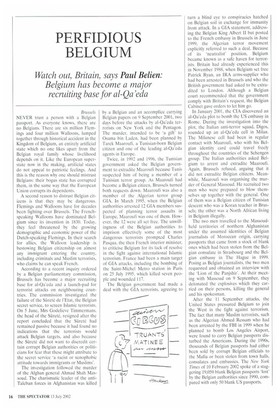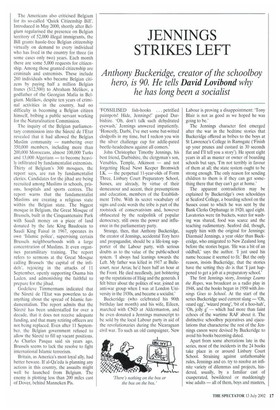PERFIDIOUS BELGIUM
Watch out, Britain, says Paul Belien:
Belgium has become a major recruiting base for al-Qa'eda
Brussels NEVER trust a person with a Belgian passport. As everyone knows, there are no Belgians. There are six million Flemings and four million Walloons, lumped together through historical accident in the Kingdom of Belgium, an entirely artificial state which no one likes apart from the Belgian royal family whose livelihood depends on it. Like the European superstate now in the making, artificial states do not appeal to patriotic feelings. And this is the reason why one should mistrust Belgians: their bogus state has corrupted them, in the same way that the European Union corrupts its dependents.
A second reason to distrust Belgian citizens is that they may be dangerous. Flemings and Walloons have for decades been fighting over Brussels. The Frenchspeaking Walloons have dominated Belgium since its invention in 1830. Today. they feel threatened by the growing demographic and economic power of the Dutch-speaking Flemings. In their search for allies, the Walloon leadership is bestowing Belgian citizenship on almost any immigrant entering the country, including criminals and Muslim terrorists, who claims he can speak French.
According to a recent inquiry ordered by a Belgian parliamentary commission, Brussels has become a major recruiting base for al-Qa'eda and a launch-pad for terrorist attacks on neighbouring countries. The commission investigated the failure of the SUrete de l'Etat, the Belgian secret service, to screen Islamic terrorists. On 5 June, Mrs Godelieve Timmermans, the head of the Stirete, resigned after the report concluded that the Stirete had remained passive because it had found no indications that the terrorists would attack Belgian targets, and also because the Surete did not want to discredit certain corrupt Belgian authorities or politicians for fear that these might attribute to the secret service 'a racist or xenophobic attitude towards immigrants or Muslims'.
The investigation followed the murder of the Afghan general Ahmad Shah Massoud. The charismatic leader of the antiTaleban forces in Afghanistan was killed by a Belgian and an accomplice carrying Belgian papers on 9 September 2001, two days before the attacks by al-Qa'eda terrorists on New York and the Pentagon. The murder, intended to be 'a gift' to Osama bin Laden, had been planned by Tarek Maaroufi, a Tunisian-born Belgian citizen and one of the leading al-Qa'eda agents in Europe.
Twice, in 1992 and 1996, the Tunisian government asked the Belgian government to extradite Maaroufi because Tunis suspected him of being a member of a Tunisian terror group. As Maaroufi had become a Belgian citizen, Brussels turned both requests down. Maaroufi was also a member of the Algerian terror group GIA. In March 1995, when the Belgian authorities arrested 12 GIA members suspected of planning terror assaults in Europe, Maaroufi was one of them. However. the 12 were all set free. The unwillingness of the Belgian authorities to imprison effectively sonic of the most dangerous terrorists prompted Charles Pasqua, the then French interior minister, to criticise Belgium for its lack of resolve in the fight against international Islamic terrorism. France had been a main target of GIA attacks, including the bombing of the Saint-Michel Metro station in Paris on 25 July 1995, which killed seven people and wounded 117.
The Belgian government had made a deal with the GIA terrorists, agreeing to turn a blind eye to conspiracies hatched on Belgian soil in exchange for immunity from attack. In a GIA statement, addressing the Belgian King Albert II but posted to the French embassy in Brussels in June 1999, the Algerian terror movement explicitly referred to such a deal. Because of its 'neutralist' position, Belgium became known as a safe haven for terrorists. Britain had already experienced this in November 1988, when Belgium set free Patrick Ryan, an IRA arms-supplier who had been arrested in Brussels and who the British government had asked to be extradited to London. Although a Belgian court recommended that the government comply with Britain's request. the Belgian Cabinet gave orders to let him go.
In January 2001, the CIA discovered an al-Qa'eda plot to bomb the US embassy in Rome. During the investigation into the plot, the Italian anti-terror squad, Digos, rounded up an al-Qa'eda cell in Milan. The Milanese cell had been in regular contact with Maaroufi, who with his Belgian identity card could travel freely throughout the countries of the Schengen group. The Italian authorities asked Belgium to arrest and extradite Maaroufi. Again, Brussels refused, arguing that it did not extradite Belgian citizens. Meanwhile, Maaroufi was organising the murder of General Massoud. He recruited two men who were prepared to blow themselves up together with the general. One of them was a Belgian citizen of Tunisian descent who was a Koran teacher in Brussels; the other was a North African living in Belgium illegally.
The two men travelled to the Massoudheld territories of northern Afghanistan under the assumed identities of Belgian journalists of Moroccan origin, carrying passports that came from a stock of blank ones which had been stolen from the Belgian consulate in Strasbourg and the Belgian embassy in The Hague in 1999. Posing as Belgian journalists, the two men requested and obtained an interview with the 'Lion of the Panjshir'. At their meeting with Massoud on 9 September, they detonated the explosives which they carried on their persons, killing the general and his spokesman.
After the 11 September attacks, the United States pressured Belgium to join the West in the fight against terrorism. The fact that many Muslim terrorists, such as the Algerian Ahmed Ressam who had been arrested by the FBI in 1999 when he planned to bomb Los Angeles Airport, were found to carry Belgian passports disturbed the Americans. During the 1990s, thousands of Belgian passports had either been sold by corrupt Belgian officials to the Mafia or been stolen from town halls, consulates and embassies. The New York Times of 10 February 2002 spoke of a staggering 19,050 blank Belgian passports 'lost' by the Belgian authorities since 1990, compared with only 50 blank US passports. The Americans also criticised Belgium for its so-called 'Quick Citizenship Bill'. Introduced in May 2000, shortly after Belgium regularised the presence on Belgian territory of 52,000 illegal immigrants, the Bill grants hassle-free Belgian citizenship virtually on demand to every individual who has lived in the country for three (in some cases only two) years. Each month there are some 5,000 requests for citizenship. Among those granted citizenship are criminals and extremists. These include 260 individuals who became Belgian citizens by paying half a million Belgian francs ($12,500) to Abraham Melikov, a godfather of the Georgian Mafia in Belgium. Melikov, despite ten years of criminal activities in the country, had no difficulty in becoming a Belgian citizen himself, bribing a public servant working for the Naturalisation Commission.
The inquiry of the Belgian parliamentary commission into the Sfirete de l'Etat revealed that it had allowed the Belgian Muslim community — numbering over 350,000 members, including more than 200,000 Moroccans, almost 100,000 Turks and 13,000 Algerians — to become heavily infiltrated by fundamentalist extremists. Thirty of Belgium's 300 mosques, the report says, are run by fundamentalist clerics. Candidates for the jihad are being recruited among Muslims in schools, prisons, hospitals and sports centres. The report warns that the fundamentalist Muslims are creating a religious state within the Belgian state. The biggest mosque in Belgium, the Great Mosque of Brussels, built in the Cinquantenaire Park with Saudi money on a piece of land donated by the late King Baudouin to Saudi King Faisal in 1967, operates its own `Islamic police', supervising certain Brussels neighbourhoods with a large concentration of Muslims. It even organises paramilitary training. The report refers to sermons at the Great Mosque calling Brussels 'the capital of the infidels', rejoicing in the attacks of 11 September, openly supporting Osama bin Laden, and admonishing the faithful to prepare for the jihad.
Godelieve Timmermans indicated that the Sarete de lEtat was powerless to do anything about the spread of Islamic fundamentalism. The report admits that the SCirete has been understaffed for over a decade, that it does not receive adequate funding, and that many retiring officers are not being replaced. Even after 11 September, the Belgian government refused to allow the Silrete to fill up vacant positions. As Charles Pasqua said six years ago. Brussels seems to lack the resolve to fight international Islamic terrorism.
Britain, as America's most loyal ally, had better beware. If al-Qa'eda is planning any actions in this country, the assaults might well be launched from Belgium. The enemy is plotting less than 200 miles east of Dover, behind Manneken Pis.



































































 Previous page
Previous page